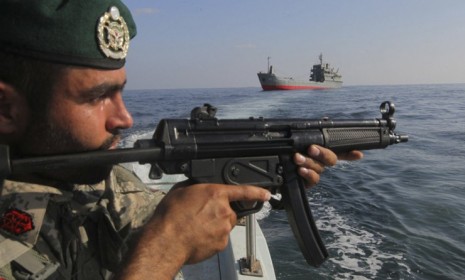Iran's oil-blockade threat: Mere 'saber-rattling'?
Tehran warns that it may stop oil from passing through the critical Strait of Hormuz. The U.S. fires back that it will tolerate no such thing

A free daily email with the biggest news stories of the day – and the best features from TheWeek.com
You are now subscribed
Your newsletter sign-up was successful
About one-sixth of the world's oil shipments pass through the Strait of Hormuz — a narrow opening connecting the Persian Gulf and Indian Ocean. So when Iran threatens to block the passage, people take notice. On Tuesday, Iranian Vice President Mohammad-Reza Rahimi said that if the West imposes new sanctions on Iran's oil exports, "then even one drop of oil cannot flow from the Strait of Hormuz." Iran is already conducting a 10-day naval exercise, and its navy chief boasted Wednesday that "closing the Strait of Hormuz is very easy for Iranian naval forces." The U.S. dismissed Iran's threat as "saber-rattling," but also warned that the U.S. will "do what we must to ensure the strait remains open." Here's what you should know:
What prompted the latest standoff?
President Obama is preparing to sign a Pentagon funding measure with a provision that could sharply curtail Iran's oil revenue by penalizing foreign companies that conduct business with Iran's central bank. The U.S. move, and the European Union's consideration of an embargo on Iran's oil, are meant to pressure Iran to give up its nuclear weapons program. Iran's latest gambit is meant to apply pressure, too: Even threatening a blockade briefly sent oil prices higher, and Iran knows that higher oil prices would hurt Obama's re-election chances.
The Week
Escape your echo chamber. Get the facts behind the news, plus analysis from multiple perspectives.

Sign up for The Week's Free Newsletters
From our morning news briefing to a weekly Good News Newsletter, get the best of The Week delivered directly to your inbox.
From our morning news briefing to a weekly Good News Newsletter, get the best of The Week delivered directly to your inbox.
How seriously should we take this threat?
Saudi Arabia and other oil exporters have pledged to pump more oil to offset any shortfall from an Iran blockade. "But if Iran blocks the Strait, all Gulf oil would be blocked," energy analyst Robin Mills tells Bloomberg. Indeed, "closing the Strait of Hormuz would be an economic catastrophe," but it could also be a military catastrophe for Iran, says Dan Murphy in The Christian Science Monitor. This chest-thumping is mostly just Iran's "way to send a strategic message" to the West: "We can make you suffer if provoked." Well, "it's starting to become the boy who cried wolf," KBC Asset Management's Samuel Ciszuk tells Bloomberg. "The Iranians are mentioning more frequently that they could close the strait and the markets don't jump as much."
Could Iran actually block the strait?
"Could they? Sure," says The Christian Science Monitor's Murphy. Iran's navy could sink a tanker or litter the passage with sea mines. But such a blockade wouldn't last long. "At best, Iran can posture and potentially disrupt traffic for a short duration," Hofstra University global trade expert Jean-Paul Rodrigue tells CNN. And it would be a "suicidal" move on Iran's part. China, Japan, and Europe depend more on Iranian oil than the U.S. does, so while the U.S. would take the lead in dismantling Iran after a blockade attempt, it wouldn't be the only military involved. And remember, the $8 billion Iran spends on its military is about 1/80th of what the U.S. spends.
A free daily email with the biggest news stories of the day – and the best features from TheWeek.com
Sources: AP, Bloomberg, Christian Science Monitor, CNN, New York Times
-
 ‘Restaurateurs have become millionaires’
‘Restaurateurs have become millionaires’Instant Opinion Opinion, comment and editorials of the day
-
 Earth is rapidly approaching a ‘hothouse’ trajectory of warming
Earth is rapidly approaching a ‘hothouse’ trajectory of warmingThe explainer It may become impossible to fix
-
 Health insurance: Premiums soar as ACA subsidies end
Health insurance: Premiums soar as ACA subsidies endFeature 1.4 million people have dropped coverage